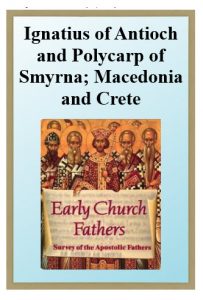IGNATIUS, THE MARTYR OF ANTIOCH, is regarded as the most important and most successful ecclesiastical representative in the second-century struggle against heresy prior to Justin. He is an organization man whose significance H. Lietzmann recently characterized thus: “In Ignatius we already find that the monarchial episcopate is an accomplished fact and is applicable to both Syria and western Asia Minor.”[1] I think that with a man like Ignatius who, in his exuberance, time and again loses all sense of proportion, one must be especially careful in evaluating the accuracy of his statements.
Indeed, he even speaks of communities such as Magnesia and Tralles, whose situation he knows primarily from the descriptions of their “bishops,” who had no reason to place themselves and their influence in an unfavourable light. That Ignatius is less concerned with depicting the actual situation than with portraying the ideal is already suggested by the fact that, for the most part, his approach takes the form of admonition rather than of description.
What is it that makes the monarchial episcopacy seem so attractive to a man like Ignatius? First of all, he does not begin from a position in which he sees a plurality of ecclesiastical bodies of officials who for practical reasons may be governed by one particular office which, nevertheless, is not necessarily superior. No, for him the first and foremost figure is the bishop, who is like God or Christ in whose place he stands.[2]
